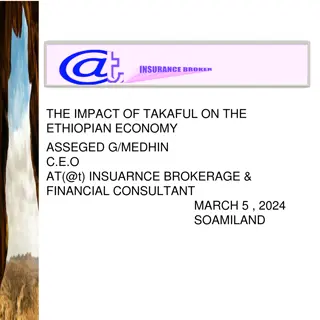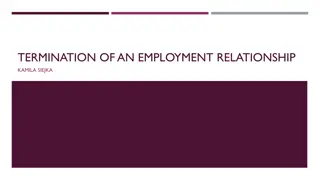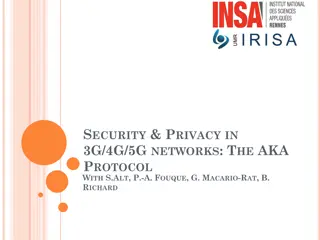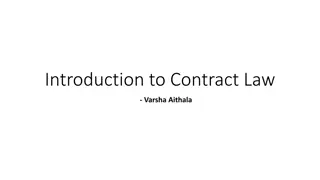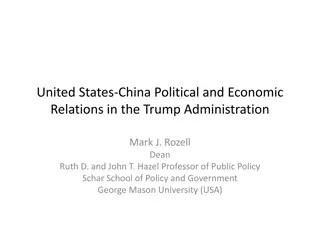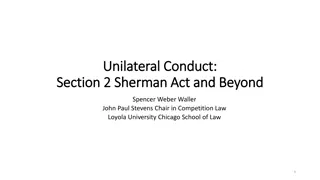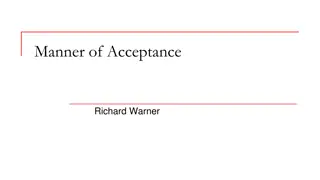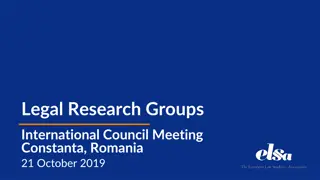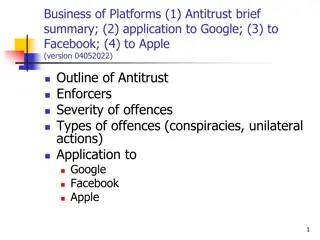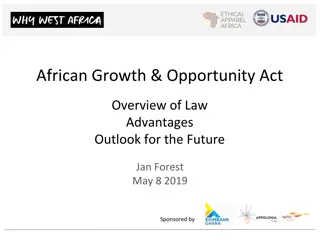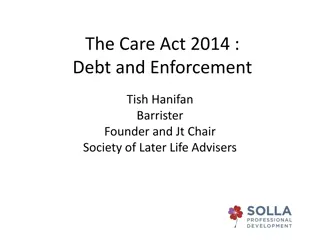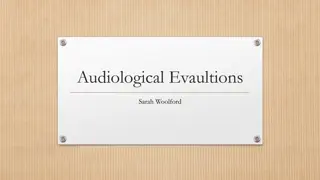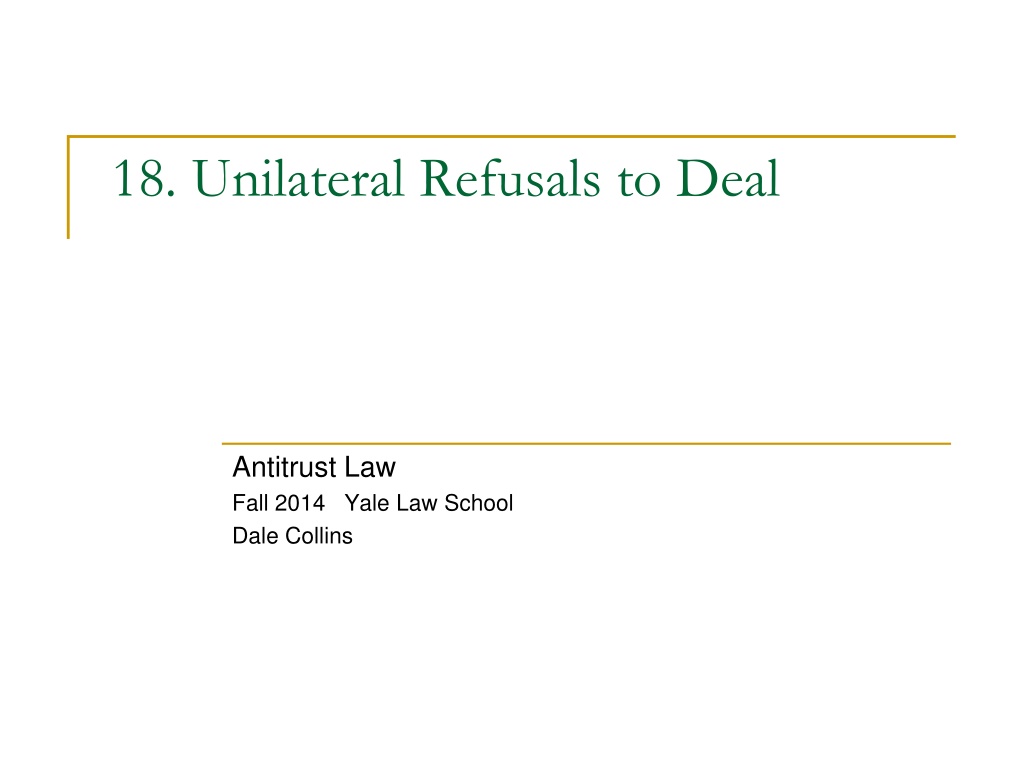
Unilateral Refusals to Deal in Antitrust Law
Learn about unilateral refusals to deal in antitrust law, where a firm refuses to engage with another firm in various ways. Understand the circumstances under which such refusals may violate antitrust laws and the statutory coverage under the Sherman Act. Explore the concept of no general antitrust duty to deal.
Download Presentation

Please find below an Image/Link to download the presentation.
The content on the website is provided AS IS for your information and personal use only. It may not be sold, licensed, or shared on other websites without obtaining consent from the author. If you encounter any issues during the download, it is possible that the publisher has removed the file from their server.
You are allowed to download the files provided on this website for personal or commercial use, subject to the condition that they are used lawfully. All files are the property of their respective owners.
The content on the website is provided AS IS for your information and personal use only. It may not be sold, licensed, or shared on other websites without obtaining consent from the author.
E N D
Presentation Transcript
18. Unilateral Refusals to Deal Antitrust Law Fall 2014 Yale Law School Dale Collins
Unilateral Refusals to Deal Concept Firm A, acting solely on its own, refuses to deal with Firm B Examples Firm A refuses to sell a product or service to Firm B Firm A refuses to buy a product or service from Firm B Firm A refuses to allow Firm B to interconnect to Firm A s network Firm A refuses to provide Firm B with advance notice of Firm A s design changes, preventing Firm B from adapting its products and having them available for sale at the time of Firm A new design release Firm A refuses to design its products so that Firm B s product will work with them Question Under what circumstances, if any, is Firm A s refusal to deal a violation of the antitrust laws? Antitrust Law Fall 2014 Yale Law School Dale Collins 2
Unilateral Refusals to Deal Statutory coverage Sherman Act 1: Not applicable provided that the refusal to deal stays unilateral Sherman Act 2: Applies to unilateral action, but the refusal to deal must Be anticompetitively exclusionary, and Be part of a scheme to obtain or maintain monopoly power in a relevant market (monopolization) or have a dangerous probability of achieving a monopoly (attempted monopolization) Remember: Footnote 4 of Trinko requires that every antitrust violation satisfy each and every element of the prima facie case for some statutory violation.1 1 Verizon Commc ns Inc. v. Law Offices of Curtis V. Trinko, LLP, 540 U.S. 398, 415 n.4 (2004). Antitrust Law Fall 2014 Yale Law School Dale Collins 3
Unilateral Refusals to Deal No general antitrust duty to deal A simple unilateral refusal to deal is not an anticompetitive exclusionary act that can predicate a Section 2 violation in the absence of a violation of an antitrust deal to deal There is no general duty to deal imposed by the antitrust laws1 This is known as the Colgate doctrine Duties to deal imposed by other (regulatory) laws do not create a duty to deal under the antitrust laws unless Congress so specifies2 1 United States v. Colgate & Co., 250 U.S. 300 (1919). 2 Verizon Commc ns Inc. v. Law Offices of Curtis V. Trinko, LLP, 540 U.S. 398 (2004). Antitrust Law Fall 2014 Yale Law School Dale Collins 4
Unilateral Refusals to Deal Policy rationale Firms may acquire monopoly power by establishing an infrastructure that renders them uniquely suited to serve their customers. Compelling such firms to share the source of their advantage is in some tension with the underlying purpose of antitrust law, since it may lessen the incentive for the monopolist, the rival, or both to invest in those economically beneficial facilities. Enforced sharing also requires antitrust courts to act as central planners, identifying the proper price, quantity, and other terms of dealing a role for which they are ill-suited. Moreover, compelling negotiation between competitors may facilitate the supreme evil of antitrust: collusion. Thus, as a general matter, the Sherman Act "does not restrict the long recognized right of [a] trader or manufacturer engaged in an entirely private business, freely to exercise his own independent discretion as to parties with whom he will deal. United States v. Colgate & Co., 250 U.S. 300, 307(1919).1 Summary Reduces incentives to greater better products or services in order to gain a competitive advantage Problems setting, monitoring and enforcing terms of dealing May facilitate collusion 1 Verizon Commc ns Inc. v. Law Offices of Curtis V. Trinko, LLP, 540 U.S. 398, 407-08 (2004). Antitrust Law Fall 2014 Yale Law School Dale Collins 5
Unilateral Refusals to Deal Exceptions Aspen1 However, "[t]he high value that we have placed on the right to refuse to deal with other firms does not mean that the right is unqualified." Aspen Skiing Co. v. Aspen Highlands Skiing Corp., 472 U.S. 585, 601 (1985). Under certain circumstances, a refusal to cooperate with rivals can constitute anticompetitive conduct and violate 2. We have been very cautious in recognizing such exceptions, because of the uncertain virtue of forced sharing and the difficulty of identifying and remedying anticompetitive conduct by a single firm. The question before us today is whether the allegations of respondent's complaint fit within existing exceptions or provide a basis, under traditional antitrust principles, for recognizing a new one.1 Requirements Prior voluntary (and presumably profitable) course of dealing Termination of that prior course Sacrifice of short-term profits because of the termination Expectation that sacrifice of short-term profits from the termination will lead to higher profits in the long term resulting from anticompetitive changes in the market Observation Subsequent courts have often noted that the Aspen defendant refused to sell to the plaintiff even at full retail price that the defendant readily sold to other third parties. 1 Aspen Skiing Co. v. Aspen Highlands Skiing Corp., 472 U.S. 585 (1985) (discussed infra) 2Verizon Commc ns Inc. v. Law Offices of Curtis V. Trinko, LLP, 540 U.S. 398, 408 (2004) (finding no exception in the circumstances of the case). Antitrust Law Fall 2014 Yale Law School Dale Collins 6
Unilateral Refusals to Deal Turning a unilateral conditional sales policy into concerted action1 Conditional sales policy Scenario You are free to do anything you want, but please be aware that I will continue to deal with you only as long as you follow my sales policy When the downstream firm violates the seller s sales policy, the seller refuses to continue to sell to the downstream firm Rule: Standing alone, announcing a conditional sales policy and refusing to sell to a firm that violates the policy is not an exclusionary act that can predicate a Section 2 violation This is the classic example of the application of the Colgate doctrine Agreement to abide by conditional sales policy Scenario I know that I violated your sales policy. I promised not to do it again. Please continue selling to me. And the seller continues to sell. Courts treat this as concerted action cover by Sherman Act 1. The key to unilateral action is that the downstream firm must not make any explicit or implicit promise to abide by the seller s sale policy 1 United States v. Parke, Davis & Co., 362 U.S. 29 (1960). Antitrust Law Fall 2014 Yale Law School Dale Collins 7
Exceptions to the Colgate Rule Other exceptions to the Colgate rule Secondary boycotts: I will not deal with you if you deal with Firm X 1 Enlisting third parties to monitor compliance with a conditional sales policy2 (Perhaps) a discriminatory refusal to deal3 Discontinuing an historical, profitable course of dealing with a competitor with intent to destroy competition and harm a competitor, with the result that the seller gains or preserves monopoly power4 These are the facts in Aspen Skiing, which the TrinkoCourt described this as at or near the outer boundary of 2 liability. 5 1 Lorain Journal Co. v. United States, 342 U.S. 143 (1951). 2 United States v. Parke, Davis & Co., 362 U.S. 29 (1960). 3 Otter Tail Power Co. v. United States, 410 U.S. 366 (1973). 4 Aspen Skiing Co. v. Aspen Highlands Skiing Corp., 472 U.S. 585 (1985). 5 Verizon Commc ns Inc. v. Law Offices of Curtis V. Trinko, LLP, 540 U.S. 398, 409 (2004) Antitrust Law Fall 2014 Yale Law School Dale Collins 8
The Essential Facilities Doctrine The concept The essential facilities doctrine imposes on the owner of a facility that cannot reasonably be duplicated and which is essential to competition in a given market a duty to make that facility available to its competitors on a reasonable nondiscriminatory basis Example: A railroad owns a bridge over a river. If the bridge could not reasonably be duplicated, the railroad would have an antitrust duty to make the bridge available to its railroad-competitors on reasonable nondiscriminatory terms This is Terminal Railroad, except that a single railroad rather than a railroad consortium owns the bridge Origins The single-firm version has its source in Otter Tail,1 where an electric utility was forced to allow a competitor to transmit power over its lines Judicial acceptance At best, the doctrine gained only limited acceptance by the courts as an antitrust rule The Supreme Court has never explicitly recognized the doctrine 1 Otter Tail Power Co. v. United States, 410 U.S. 366 (1973). Antitrust Law Fall 2014 Yale Law School Dale Collins 9
The Essential Facilities Doctrine Requirements 1 Courts that have accepted the doctrine usually require the following: Control of the essential facility by a monopolist A competitor's inability practically or reasonably to duplicate the essential facility The denial of the use of the facility to a competitor The feasibility of providing the facility 1See MCI Commc ns Corp. v. AT&T Co.,, 708 F.2d 1081. 1132-33 (7th Cir.1982), Antitrust Law Fall 2014 Yale Law School Dale Collins 10
The Essential Facilities Doctrine Two interpretations Where the requirements of the essential facility doctrine apply, the failure to provide reasonable nondiscriminatory access to competitors violates the antitrust laws This was the usual interpretation This interpretation surely has been rejected by Trinko, since the doctrine s four elements by themselves do not satisfy the requirements for a prima facie case of monopolization or attempted monopolization A more nuanced interpretation is that the doctrine's four elements define when a refusal to provide reasonable nondiscriminatory access qualifies as an anticompetitively exclusionary act that could predicate a monopolization or attempted monopolization violation1 But this appears to be rejected by Trinko as well, since the facts of Trinko satisfied the four requirements (and in addition a regulatory duty to deal) and yet the Court reversed the lower court, which had used the essential facilities doctrine to find an antitrust violation Vitality today Today, especially after Trinko, the doctrine as applied to single firms is essentially dead The Terminal Railroad rule, which speaks to the duty of a horizontal combination to provide reasonable nondiscriminatory access to non-consortium competitors remains well-accepted law 1See MCI Commc ns Corp. v. AT&T Co.,, 708 F.2d 1081 (7th Cir.1982). Antitrust Law Fall 2014 Yale Law School Dale Collins 11
Seminal Cases Antitrust Law Fall 2014 Yale Law School Dale Collins 12
United States v. Colgate & Co.1 Indictment (1917): Resale price maintenance under Dr. Miles Charged that Colgate had created and engaged in a combination in violation of Section 1 with its wholesale and retail dealers to fix the resale prices of Colgate s laundry soaps, toilet soaps and other toilet articles and so competition among its dealers Factual allegations: Colgate distributed lists of uniform resale prices, urged dealers to conform to them informed dealers that Colgate would refuse to sell to those that did not adhere to its price lists requested dealers to inform Colgate of other dealers who sold at different prices maintained lists of nonconforming dealers Reinstated dealers on the suspended list if they gave assurances that they would adhere to the lists in the future District court: Sustained demurrer No monopolization or attempted monopolization charged No horizontal manufacturer conspiracy No allegation that Colgate s prices were unfair No allegation that Colgate restricted the buyers to whom its dealers could resell or required its dealers to impose resale restrictions on their customers Colgate had no contracts with its dealers that require them to sell at Colgate s resale prices Indictment was solely against Colgate 1 250 U.S. 300 (1919). Antitrust Law Fall 2014 Yale Law School Dale Collins 13
United States v. Colgate & Co. Supreme Court: Affirmed (9-0) Procedure Direct appeal under Criminal Appeals Act Bound by district court s interpretation that there was no contract between Colgate and its dealers to maintain resale prices Merits Key: Unilateral sales policy [A Colgate dealer], after buying, could, if he chose, give away his purchase or sell it at any price he saw fit, or not sell it at all, his course in these respects being affected only by the fact that he might by his action incur the displeasure of the manufacturer who could refuse to make further sales to him, as he had the undoubted right to do.1 Rule: A seller may announce a sales policy as to the conditions under which it will sell and is free to refuse to continue to sell to buyers that do not abide by the rules Footnotes This is a very technically based opinion, yet one that announced a fundamental rule of antitrust law Colgate s counsel: former Justice Charles Evans Hughes, the author of the Court s opinion in Dr. Miles 1Colgate, 250 U.S. at 306 (quoting 253 F. 522, 527 (E.D. Va. 1918)). Antitrust Law Fall 2014 Yale Law School Dale Collins 14
Lorain Journal Co. v. United States1 Background Since at least 1932, Lorain Journal was the only newspaper in Lorain, Ohio In 1948, WEOL established in Elvira, Ohio, 8 miles south of Lorain Lorain Journal refused to accept local advertisements from anyone: Who advertised on WEOL, or LJ believed was about to advertised on WEOL Complaint Sherman Act 1 conspiracy between Loran J. Co. & 4 of its officers/Sherman 2 conspiracy to monopolize Sherman 2 attempt to monopolize District court: Found for plaintiff on attempt to monopolize Supreme Court: Affirmed Relevant markets Interstate news National advertising Conduct exclusionary Secondary boycott Advertising in LJ essential to local merchants Local merchants would not advertise on WEOL WEOL could not survive without local advertising Dangerous probability of success (specific intent to monopolize not challenged) 1 342 U.S. 143 (1951). Antitrust Law Fall 2014 Yale Law School Dale Collins 15
United States v. Parke, Davis & Co.1 Background Parke, Davis A major pharmaceutical manufacturer, producing some 600 products that it distributed through drug wholesalers and retailers Had announced policy that it would not continue to sell to wholesalers and retailers that followed PD s suggested resale prices PD intended its practices to fall within the Colgate doctrine Violation of policy In 1956, several retailers in the District of Columbia and Virginia advertised and sold PD vitamin products at prices substantially less than PD s suggested resale level PD response PD would not sell to wholesalers that sold PD products to any retailer that did not abide by PD s resale price policy PD told each of the five area wholesalers that it was imposing the same policy on all wholesalers All five area wholesalers indicated a willingness to follow the new policy PD informed each of the area retailers of this new policy and of the fact that the policy would apply to all area retailers Several retailers indicated their willingness to abide by PD s suggested resale prices Other retailers continued to sell at discounted prices PD provided the names of the discounting retailers to the area wholesalers Thereafter, neither PD nor its wholesalers would sell PD products to the identified retailers Once the retailers ceased selling below Parke, Davis' suggested retail resale prices, however, Parke, Davis resumed selling to them and authorized its wholesalers to do the same 1 362 U.S. 29 (1960). Antitrust Law Fall 2014 Yale Law School Dale Collins 16
United States v. Parke, Davis & Co.1 Complaint Alleging that PD s actions in securing compliance to its suggested retail prices went beyond what Colgate permitted and so violated Section 1 of the Sherman Act District court: Dismissed complaint After the government completed the presentation of its evidence at trial, and without hearing PD s evidence in its defense, the district court dismissed the complaint for the government's failure to prove its prima facie case Supreme Court : Reversed (6-3) Brennan (for six members) Colgate limited to announcement of policy and a simple refusal to deal with those that do not abide Here, PD Engaged in a secondary boycott with wholesalers against discounting retailers and disseminated names of discounting retailers to wholesalers in furtherance of this boycott Reached agreement with some retailers that they would cease discounting Sometimes a simple agreement Other times, particular retailers required PD to obtain agreement from other retailers that they each would cease discounting before the target discounter would agree to stop discounting (i.e., I will agree to stop discounting only if you get my competitors A and B to stop discounting ) Remanded with instructions to enter judgment for the government Harlan (dissenting, with two other members) Colgate should apply on the facts found by the district court Majority went beyond those facts 1 362 U.S. 29 (1960). Antitrust Law Fall 2014 Yale Law School Dale Collins 17
Official Airline Guides, Inc. v. FTC1 Background OAG Published the monthly Official Airline Guide the bible for flight information which provided detailed flight information between city pairs (e.g., between New York and Indianapolis) for the following types of flights: Direct flights of certificated carriers Connecting flights of certificated carriers, that is, flights involving the use of one direct flight in conjunction with another to provide transportation between two cities Direct flights of intrastate air carriers Direct flights of commuter air carriers OAG did not publish flight schedules for connecting flights of commuter air carriers FTC OAG was a monopolist in flight information Its refusal to list fight information for connecting flights of commuter air carriers significantly handicapped them in competing with certificated carriers in violation of FTC Act 5 Second Circuit: Reversed Upheld FTC s findings of significant competition between certificated and commuter carriers, injury to that competition as a result of OAG s refusal to publish connecting commuter flight information, and that this refusal was arbitrary (unjustified) But OAG was not a competitor in airline fights and neither Section 5 nor the antitrust laws impose a duty to deal on noncompetitors acting unilaterally even if arbitrarily 1 630 F.2d 920 (2d Cir. 1980). Antitrust Law Fall 2014 Yale Law School Dale Collins 18
Aspen Skiing Co. v. Aspen Highlands Skiing1 Background Between 1945-1967, three major facilities independently developed: Aspen Mountain (Ajax) by Ski Co. in 1946 Aspen Highlands (Highlands) in 1957 Buttermilk, (1958) which was acquired by Ski Co. in 1964 Snowmass, developed by Ajax in 1967 Tickets For a number of years, Ski Co. and Highlands cooperatively offered an all-Aspen ticket In 1979, after repeatedly demanding an increased share of the proceeds, the defendant withdrew its participation in the all-Aspen ticket Highlands response Tried to recreate joint ticket, even offering to buy Ski co. s tickets at retail Without all-Aspen ticket, Highlands became a "day" ski resort Share steadily declined from 20.5% (1976-77) to 11% in 1980-81 (making Ski Co. 89%) Ancillary revenues from ski school, ski rentals, restaurants also declined Highlands complaint Ski Co. monopolized market for downhill skiing at Aspen Prayer: Treble damages and injunction to continue to deal 1 472 U.S. 585 (1985). Antitrust Law Fall 2014 Yale Law School Dale Collins 19
Aspen Skiing Co. v. Aspen Highlands Skiing Lower courts District court Jury: Found for plaintiff and awarded $2.5M actual damages ($7.5 million trebled) Court: Injunction requiring Ski Co. to participate in a 4-area, 6-out-of-7 day pass for a period of 3 years Tenth Circuit: Affirmed Supreme Court: Affirmed (8-0). Opinion by Justice Stevens Relevant market: Not contested Monopoly power: Not contested Intent: General intent sufficient for monopolization Exclusionary act : Refusal to deal not exclusionary Stevens: Evidence was sufficient for jury to find that refusal to deal was anticompetitively exclusionary All-Aspen ticket was profitable to Ski Co. as shown by its willingness to participate for years Consumers strongly valued the all-Aspen ticket consumers were materially harmed by the refusal Refusal impaired Highlands ability to compete and increased Ski Co. s share Highland s share dropped from 20% to 11% over four years since the all-Aspen pass discontinued Ski Co. had no efficiency justification Unwillingness to sell Highlands tickets even at retail price showed that Ski Co. wished to harm a competitor by reducing competition (i.e., the ability of its only competitor to compete) Conclusion: Evidence sufficient to support jury finding Jury could have concluded that Ski Co. elected to forgo . . . short-run benefits because it was more interested in reducing competition in the Aspen market over the long run by harming its smaller competitor. Antitrust Law Fall 2014 Yale Law School Dale Collins 20
Aspen Skiing Co. v. Aspen Highlands Skiing Supreme Court (con t) Remember the procedural posture of the case (challenge to the sufficiency of the evidence): Perhaps most significant, however, is the evidence relating to Ski Co. itself, for Ski Co. did not persuade the jury that its conduct was justified by any normal business purpose. Ski Co. was apparently willing to forgo daily ticket sales both to skiers who sought to exchange the coupons contained in Highlands' Adventure Pack, and to those who would have purchased Ski Co. daily lift tickets from Highlands if Highlands had been permitted to purchase them in bulk. The jury may well have concluded that Ski Co. elected to forgo these short-run benefits because it was more interested in reducing competition in the Aspen market over the long run by harming its smaller competitor.1 Trinko take on Aspen Aspen Skiing is at or near the outer boundary of 2 liability. The Court there found significance in the defendant's decision to cease participation in a cooperative venture. The unilateral termination of a voluntary (and thus presumably profitable) course of dealing suggested a willingness to forsake short-term profits to achieve an anticompetitive end. Similarly, the defendant's unwillingness to renew the ticket even if compensated at retail price revealed a distinctly anticompetitive bent.2 Footnote: In 2001, Ski Co. acquired Highlands 1 Aspen Skiing, 472 U.S. at 608. 2Trinko, 540 U.S. at 409. Antitrust Law Fall 2014 Yale Law School Dale Collins 21
Verizon Commcns Inc. v. Trinko1 Background To facilitate entry into local telephone service, the Telecommunications Act of 1996 requires Incumbent Local Exchange Carriers (ILECs) the original Baby Bell companies to provide new, so-called Competitive Local Exchange Companies (CLECs) with access to the ILEC s local telephone network, including access to individual network elements on an unbundled basis Verizon, the ILEC in New York State, signed interconnection agreements with a number of CLECs, including AT&T (the long-distance carrier, which wanted to also provide local telephone service) When CLECs complained to the FCC that Verizon was failing to deal with them as required by the Telecommunications Act, the FCC opened an investigation, which resulted in a consent decree that imposed financial penalties and remediation measures on Verizon Complaint Trinko, a local telephone service customer of AT&T, filed a class action against Verizon alleging that Verizon had dealt with CLECs in violation of its statutory duty to deal to discourage customers from becoming customers of CLECs and maintain its local telephone service monopoly in violation of Section 2 of the Sherman Act. District court: Dismissed complaint on the pleadings Failure to allege an exclusionary act within the meaning of Section 2 The Telecommunication Act imposes a regulatory duty to deal enforceable by the FCC, but not an antirust duty to deal 1 Verizon Commc ns Inc. v. Law Offices of Curtis V. Trinko, LLP, 540 U.S. 398 (2004). Antitrust Law Fall 2014 Yale Law School Dale Collins 22
Verizon Commcns Inc. v. Trinko Second Circuit: Reversed and reinstated antitrust claim Trinko sufficiently alleged anticompetitively exclusionary conduct under two distinct theories Essential facilities Independently of the requirements of the Telecommunications Act, a monopolist has a duty to make its essential facilities available to competitors on reasonable terms Citing Aspen Skiing Co. v. Aspen Highlands Skiing Corp., 472 U.S. 585, 601 (1985) Here, the complaint alleged that Verizon s network is an essential facility to which a communication must have access in order to compete, and Verizon failed to grant reasonable access to its competitor AT&T to the Verizon network Monopoly leveraging Second Circuit recognizes monopoly leveraging as a Section 2 violation when the defendant 1. possesses monopoly power in one market; 2. uses that power to gain a competitive advantage in another distinct market; and causes injury by such anticompetitive conduct Here, the complaint alleged that Verizon has monopoly power over a wholesale market in which it sells access to the local loop to telecommunications carriers Verizon used that power to gain a competitive advantage in a retail market in which telecommunications carriers sell local phone service to consumers Trinko, as a local telephone service customers, was injured by the anticompetitive conduct Antitrust Law Fall 2014 Yale Law School Dale Collins 23
Verizon Commcns Inc. v. Trinko Supreme Court: Reversed (9-0) Scalia (for nine members) Rule: A refusal to deal is an exclusionary act for the purpose of Section 2 only if the refusal violates an antitrust duty to deal The Telecommunications Act does not create an antitrust duty to deal Congress can create an antitrust duty to deal But it did not do so in the Telecommunications Act The creation of any such duty should be clear in the statute The Telecommunications Act contained the following savings clause, which is inconsistent with the Act creating an antitrust duty to deal: [N]othing in this Act or the amendments made by this Act shall be construed to modify, impair, or supersede the applicability of any of the antitrust laws. There is no essential facility duty to deal in this case Aspen Skiing is at or near the outer boundary of 2 liability. 1 Distinguishable here Aspen involved the unilateral termination of a voluntary and profitable course of dealing and Ski Co. s unwillingness to renew the ticket even if compensated at the retail price revealed a distinctly anticompetitive bent 2 The complaint here does not allege that Verizon voluntarily engaged in a course of dealing with its rivals or would ever have done so absent statutory compulsion The Telecommunications Act s extensive provisions for access and FCC enforcement makes judicial enforcement under the antitrust laws unnecessary and inappropriate 1Trinko, 540 U.S. at 409. 2Id. Antitrust Law Fall 2014 Yale Law School Dale Collins 24
Verizon Commcns Inc. v. Trinko Supreme Court: Reversed (9-0) Scalia (for nine members) The Second Circuit s monopoly leveraging theory fails as a matter of law: The Court of Appeals also thought that respondent's complaint might state a claim under a monopoly leveraging theory (a theory barely discussed by respondent, see Brief for Respondent 24, n.10). We disagree. To the extent the Court of Appeals dispensed with a requirement that there be a dangerous probability of success in monopolizing a second market, it erred, Spectrum Sports, Inc. v. McQuillan, 506 U.S. 447, 459 (1993). In any event, leveraging presupposes anticompetitive conduct, which in this case could only be the refusal-to-deal claim we have rejected.1 1Trinko, 540 U.S. at 415 n.4. Antitrust Law Fall 2014 Yale Law School Dale Collins 25
Apple iPod Antitrust Litigation Background 2003: Apples launches iTunes music store Designed as a semi-closed system Record labels required Apple to have strict DRM ( FairPlay ) to guard against piracy July 2004: RealNetworks announced Harmony technology Allows RN music to be played on iPod October 2004: Apple releases iTunes 4.7, which employed a new encryption method and ended the operability of RN music on iPods September 2006: Apple releases iTunes 7.0 Prevented 3P applications (like RN s Jukebox ) from placing music ( syncing ) on the iPod Ostensibly to prevent corruption of iPod database January 2009: Apple announces that it has reached agreement with labels to eliminate DRM (presumably accomplished by March 2009) Class action complaint filed in January 2005 Antitrust Law Fall 2014 Yale Law School Dale Collins 26
Apple iPod Antitrust Litigation District court: May 19, 2001 SJ decision iTunes 4.7 was a genuine product improvement required by the labels design change is not an exclusionary act even if it excluded RN music from the iPod Apple had no duty to license FairPlay to RN refusal to license was not exclusionary Denied summary judgment relating to claims on the introduction of iTunes 7.0 (September 2006) Genuine issue of whether iTunes was actually designed to prevent corruption as opposed to simply preventing 3P applications from loading music onto an iPod District court: September 26, 2014 decision Denied Apple s combined motion for summary judgment and Daubert motion Plaintiff s theory on impact overcharge on iPods iTunes 7.0 made demand for iPods less elastic and so enable Apple to raise prices Customers buy more from iTunes store Cannot play iTunes music on alternative players (increased switching costs) Makes them less likely to switch ALSO: Reduced demand for 3P music, which reduced demand for 3P players Key on Daubert: Noll damages number get presented to jury Raised iPod prices to consumers by 7.45%, or $16.32 ($195 million for class) Raised iPod prices to resellers by 2.38% ($149 million to reseller class members) Jury Verdict for Apple found that iTunes 7.0 was a genuine product improvement Ended litigation, since the Ninth Circuit does not balance product improvements against competitive harms Antitrust Law Fall 2014 Yale Law School Dale Collins 27


